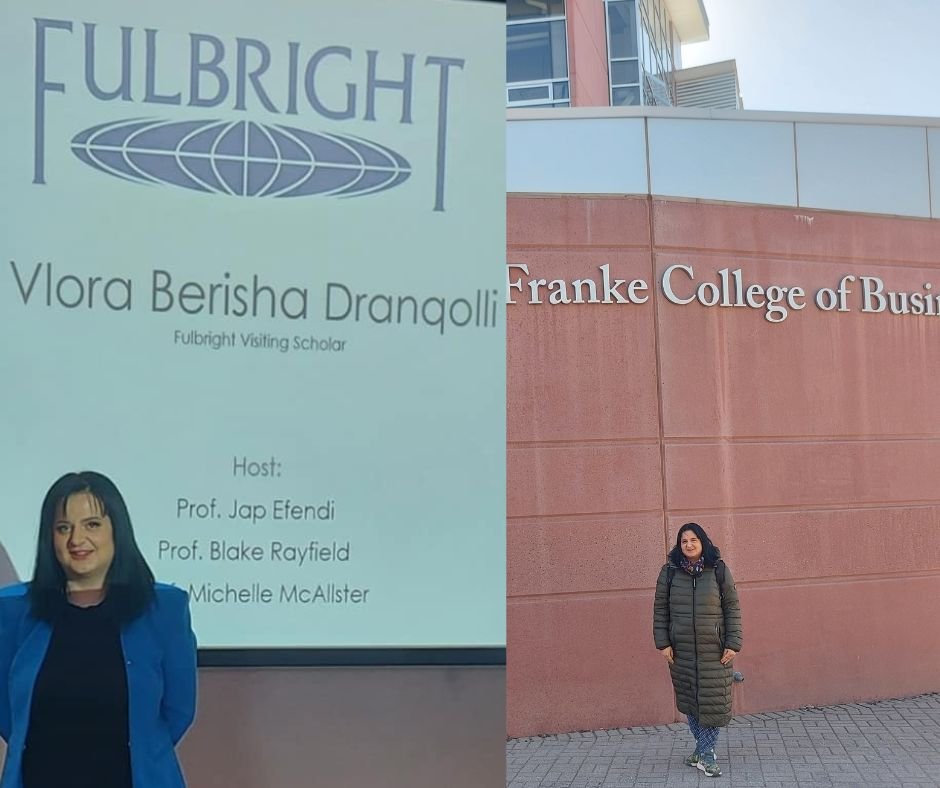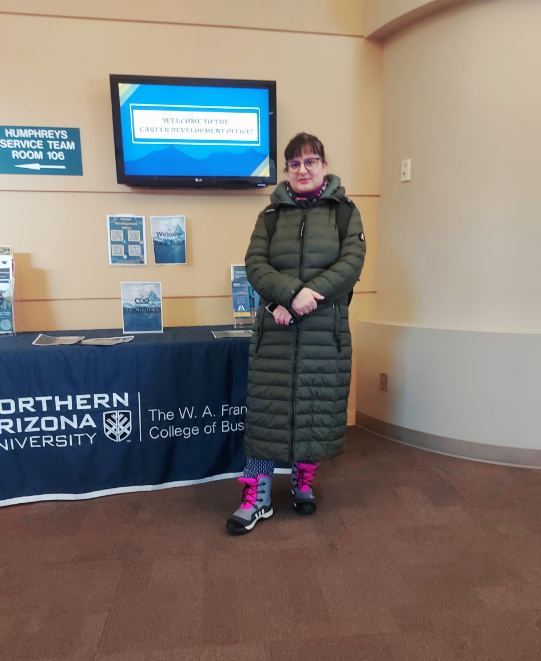Fulbright Visting Scholar Program Spotlight: Vlora Berisha-Dranqolli
Seeking admission to a prestigious program like Fulbright Visiting Scholar requires a lot of preparation. To help you better understand the program and what it offers, we bring an insider’s perspective on the Fulbright Journey.
We are continuing our series of questions with our Fulbright Visiting Scholar 2022-2023 grantee, Vlora Berisha-Dranqolli, a Fulbright Visiting Scholar at Northern Arizona University.
The Fulbright Visiting Scholar Program competition for the 2024-2025 academic year closes today, October 2, 2023.
To learn more, visit: Fulbright Scholar (Doctoral/PhD) Program in the United States (usembassy.gov)
This is a joint program of the U.S. Department of State and the Government of Kosovo
What is your educational and professional background?
I have a Ph.D. in Banking, Finance, and Accounting from the University of Hasan Prishtina. Currently, I work at the Business Faculty of the University of Haxhi Zeka, where I teach Accounting, Corporate Finance, and Auditing courses. Besides, I hold the position of Vice-Dean for Budget, Finance, and Infrastructure and am a member of the Kosovo Council for Financial Reporting.
Why did you choose to apply for the Fulbright Program?
I applied for the Fulbright Program because of its excellent reputation and competitive nature, which greatly motivated me. This program is well-known for expanding one's professional network, improving skills, and enhancing career prospects, making it highly advantageous for any academician. It perfectly aligns with my academic and professional aspirations, making it an ideal option for pursuing international academic exchange and research collaboration.
Tell us about your experience as a Fulbrighter in the U.S.?
As a part of the Fulbright program, I conducted research into Fintech (Financial Technology) innovations at the University of Northern Arizona, specifically within the W.A. Franke Business College's Department of Finance and Accounting. Under the watchful guidance of Professor Jap Efendi and co-supervisor Blake Rayfield, I embarked on an exciting research journey. However, that was not all. Beyond my research, I had the opportunity to step into the role of a lecturer for the Finance corporate class. Here, I shared insights and engaged in discussions about various aspects of Finances and Capital Budgeting Techniques with eager students. In preparation for my research, I diligently completed all the exams mandated by "The Collaborative Institutional Training Initiative (CITI Program)."
This training, essential for research involving subject consent, was a valuable foundation for my work. I actively participated in two workshops organized by the Fulbright Program and Grant Training Center to further enhance my skills and knowledge. These workshops focused on Scientific Manuscript Publishing and Social Sciences Manuscript Preparation, broadened my horizons, and honed my abilities.
What is the most valuable component you have gained from the program?
During my Fulbright experience, I was honored to present my research at the distinguished 12th CERB Conference hosted by Medgar Evers College at New York University. It was an incredible opportunity to share my findings and engage with fellow scholars. Even after returning from my Fulbright journey, I remained eager to learn more. I enrolled in the Northern Arizona Student Bloomberg certification course to continue my educational journey. Additionally, as a part of the Fulbright program, I had the opportunity to participate in "Global Education and Solving Global Problems," a program of the U.S. Department of State with funding provided by the U.S. Government, administered by IREX.
Furthermore, through the Fulbright Exchange Alumni network, we stay updated with recent global events and job opportunities and gain access to research databases. This access is invaluable in Kosovo since such databases are difficult to access.
How do you plan to implement the knowledge gained as a part of the program at your home institution?
In addition to my post-doc program, I completed a corporate finance course. I plan to modernize this course in my home country, which is currently taught manually. After gaining experience in a financial lab, I negotiated a deal with Alpha Cloud to introduce accounting software into our university's accounting course. Upon my return, I was responsible for heading the council for integrated curricula at our university, which is transforming. Our university curriculum will be enriched by incorporating aspects of the American education system. Completing CITI during Fulbright allows me to share research ethics expertise effectively. I attended the Fulbright Program and Grant Training Center workshops to expand my research skills and knowledge, enabling me to make more meaningful contributions to our institution's research initiatives. As a Center of Excellence member, I train trainers in FinTech, data analysis, and scientific research methods. I apply ethical principles from CITI and Fulbright to ensure research integrity. The Fulbright program has broadened my skills, enabling me to contribute meaningfully to our institution's research initiatives.
How was the application process for you, and what tips do you have for the prospective candidates?
The application process was straightforward for me. I began by identifying a professor in my research field who supported my application. After obtaining an invitation letter from the host university's international study office, I applied through the Fulbright online system, where I uploaded my documents and completed my application. The references from professors familiar with my work were submitted according to the system's specified time slots. A crucial tip is carefully reviewing your application before submission to ensure that all required steps are accurately completed.
What is the biggest culture shock you experienced in the U.S?
In the United States, initiating research requires compliance with rigorous Institutional Review Board (IRB) requirements. Although this process is thorough, it fosters a culture of collaboration and mutual assistance. Another cultural observation worth noting is that while often enjoying their coffee alone in their offices, individuals remain consistently approachable and demonstrate a strong willingness to help each other extensively. Additionally, supervisors play a crucial role in fostering collective problem-solving through debates rather than relying on unilateral decision-making.
What is your favorite place you have visited while participating in the Fulbright program?
Lowell Observatory in Flagstaff holds a unique status in recognition of its remarkable scientific and cultural significance. It has earned the distinction of being a Registered National Historic Landmark and an Arizona Treasure. Moreover, it has been included among "The World's 100 Most Important Places."
Personally, I wholeheartedly concur with these accolades and can attest to the fascination surrounding Lowell Observatory. When visiting Arizona, it's certainly a stop worth prioritizing.
What is your favorite American dish/food?
Navajo Fry Bread is a simple, yet delicious dish made from deep-fried dough, often served with various toppings like ground beef, beans, lettuce, cheese, and salsa.


